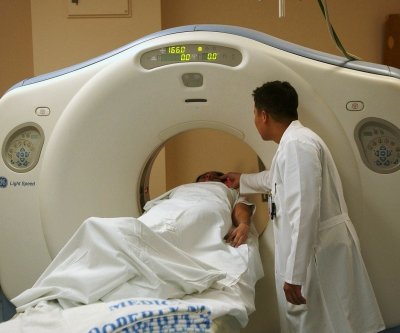
More than 75K in Wuhan may have coronavirus, analysis suggests
New estimates based on modeling research dwarf official counts, suggesting that some of those sickened may be asymptomatic or will not seek medical attention.
by Brian P. DunleavyJan. 31 (UPI) -- More than 75,000 people in the city of Wuhan, China may have been infected with the 2019 novel coronavirus, a new analysis suggests.
The findings, published Friday in the journal The Lancet, are based on epidemiologic modeling of 2019 n-CoV and its spread.
Researchers caution that, given the lack of a robust and detailed timeline of records of suspected, probable and confirmed cases of the disease, as well as information on the close contacts of those infected, the true size of the epidemic and its pandemic potential remains unclear.
"Not everyone who is infected with 2019-nCoV would require or seek medical attention," study co-author Gabriel Leung, of the University of Hong Kong, said in a statement. "During the urgent demands of a rapidly expanding epidemic of a completely new virus, especially when system capacity is getting overwhelmed, some of those infected may be under-counted in the official register."
Wuhan, a city of 11 million, is ground zero for the virus. To date, Chinese officials have confirmed nearly 10,000 cases of the disease across the entire country.
In their analysis, Leung and his colleagues used mathematical modelling to estimate the size of the epidemic based on officially reported 2019-nCoV case data and domestic and international travel data. They assumed that the serial interval estimate -- or the time it takes for infected individuals to infect other people -- for 2019-nCoV was the same as for severe acute respiratory syndrome, or SARS.
They also also modeled potential future spread of 2019-nCoV in China and internationally, taking into account the potential impact of various public health interventions that were implemented in January 2020. The measures include the use of face masks and increased personal hygiene as well as the quarantine measures introduced in Wuhan on January 23.
The results suggest that in the early stages of the Wuhan outbreak, from Dec. 1 to Jan. 25, each person infected with 2019-nCoV could have infected up to three other individuals on average, and that the epidemic doubled in size every 6.4 days. This translates to up to 75,815 individuals potentially being infected in Wuhan during the 56-day period.
"The apparent discrepancy between our modeled estimates of 2019-nCoV infections and the actual number of confirmed cases in Wuhan could also be due to several other factors," Leung said. "These include that there is a time lag between infection and symptom onset, delays in infected persons coming to medical attention, and time taken to confirm cases by laboratory testing, which could all affect overall recording and reporting."
The findings indicate that cases of 2019-nCoV infection may have spread from Wuhan to multiple other major Chinese cities as of January 25, including Guangzhou, with 111 cases; Beijing, with 113; Shanghai, with 98; and Shenzhen, with 80. In all, these cities account for over half of all outbound international air travel from China, the researchers point out.
While the estimates suggest the quarantine in Wuhan may not have completely halted the epidemic, further analysis suggests that if officials can reduce transmissibility by 25 percent in all cities nationally, the growth rate and the size of local epidemics could be substantially reduced.
A 50 percent reduction in transmissibility could shift the current 2019-nCoV epidemic from one that is expanding rapidly, to one that is slowly growing, the authors say.
"Based on our estimates, we would strongly urge authorities worldwide that preparedness plans and mitigation interventions should be readied for quick deployment, including securing supplies of test reagents, drugs, personal protective equipment, hospital supplies, and above all human resources, especially in cities with close ties with Wuhan and other major Chinese cities," Leung said.
(0) Leave a comment
upi.com/6980662
Latest Headlines

Health News // 23 minutes ago
At least 19M Americans sickened by flu so far this season, CDC says
Jan. 31 (UPI) -- The CDC on Friday it estimated that, so far this season, there have been at least 19 million flu illnesses, causing 180,000 hospitalizations and 10,000 deaths, including 68 children.

Health News // 27 minutes ago
Earlier screening for colon cancer may catch cases earlier
Jan. 31 (UPI) -- An analysis of colon and rectal cancer rates among adults in the United States found that there is a 46 percent increase in new diagnoses of the disease from ages 49 to 50, an indication that many cases are un-diagnosed.

Health News // 1 hour ago
Low levels of air pollution may add to cardiac arrest risk
All it takes is short-term exposure to fine-particle air pollution from cars and bushfires to increase the risk of cardiac arrest, a new study warns.

Health News // 9 hours ago
Study links vegetarian diet to fewer UTIs
Urinary tract infections plague millions of Americans. Now new research suggests that what they eat might have a role to play.

Health News // 10 hours ago
Suicidal thoughts, self-harm sending more in U.S. to ER
Men and women are flooding America's emergency rooms because of suicidal thoughts and injuries from harming themselves, with the CDC this week reporting a 25.5 percent increase in ER visits for them from 2017 to 2018.

Health News // 20 hours ago
WHO declares coronavirus a global public health emergency
Jan. 30 (UPI) -- World Health Organization officials on Thursday declared the 2019 novel coronavirus outbreak a public health emergency of international concern.

Health News // 22 hours ago
U.S. reports first human-to-human coronavirus case
Jan. 30 (UPI) -- CDC officials on Thursday confirmed the first "person-to-person" transmission of 2019 novel coronavirus in the U.S. -- the husband of a woman who went to China. It's the sixth case in the country overall.

Health News // 18 hours ago
Strep throat could become untreatable, researchers warn
A new study warns that strains of bacteria that cause strep throat and "flesh-eating disease" appear close to becoming resistant to penicillin and other antibiotics known as beta-lactams.

Health News // 23 hours ago
DNA damage in brain cells may explain some forms of autism, study says
Jan. 30 (UPI) -- Researchers believe they have identified a pattern of DNA damage that occurs during brain cell division and development and potentially causes autism.

Health News // 1 day ago
Annual CT screening for smokers may cut lung cancer deaths
A new Dutch study is being hailed as proof of the need for annual CT screenings of former and current longtime smokers to reduce deaths from lung cancer.